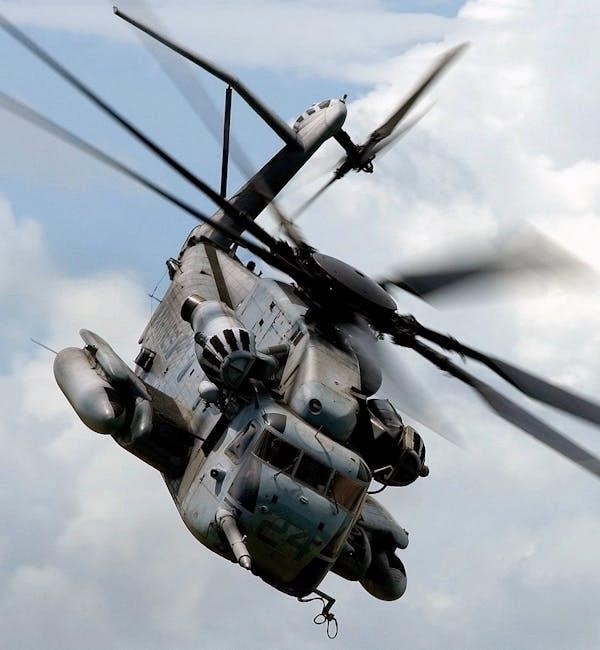The Navy’s Command Managed Equal Opportunity (CMEO) Instruction promotes a fair and inclusive environment, preventing harassment and discrimination. It ensures equal opportunity for all personnel, fostering a respectful climate.
1.1 Definition and Purpose of CMEO Instruction
The Navy’s Command Managed Equal Opportunity (CMEO) Instruction is a policy framework designed to ensure equal opportunity, prevent harassment, and promote diversity within the naval workforce. Its primary purpose is to foster an inclusive environment where all personnel can thrive without facing discrimination or unfair treatment. The instruction outlines procedures for addressing complaints, conducting investigations, and providing training to maintain a respectful and equitable command climate. By adhering to CMEO guidelines, the Navy aims to uphold its commitment to equal opportunity, ensuring that all service members are treated with dignity and respect, regardless of race, gender, or other personal characteristics. This framework is essential for maintaining mission readiness and promoting unity among naval personnel.
1.2 Evolution of the CMEO Instruction
The Navy’s Command Managed Equal Opportunity (CMEO) Instruction has evolved to address emerging issues and ensure a fair, inclusive environment. Originally established to prevent harassment and discrimination, it has been updated to reflect changing policies, legal standards, and organizational needs. Revisions have included enhanced procedures for reporting and investigating complaints, as well as expanded training requirements to promote awareness and prevention. The instruction has also incorporated feedback from command climate specialists and stakeholders to improve effectiveness. These updates ensure the CMEO Instruction remains a critical tool for fostering a respectful and equitable workplace, aligning with the Navy’s commitment to diversity and mission readiness. The evolution reflects the Navy’s dedication to maintaining a professional and inclusive culture across all ranks.

Roles and Responsibilities
Command Climate Specialists and Navy personnel collaborate to promote equality, prevent harassment, and foster a respectful climate. Their roles ensure accountability and adherence to CMEO policies and guidelines.
2.1 Overview of the CMEO Program
The Navy’s Command Managed Equal Opportunity (CMEO) Program is designed to promote a culture of inclusion, respect, and equal opportunity across all ranks. It aims to prevent harassment, discrimination, and other prohibited behaviors by fostering a positive command climate. The program emphasizes leadership accountability, ensuring that commanders and supervisors are actively engaged in maintaining a fair and equitable environment. Through training, education, and consistent policy enforcement, the CMEO Program supports the Navy’s commitment to diversity and inclusion. It also provides a framework for addressing complaints and resolving issues promptly, ensuring that all personnel can thrive in a workplace free from bias or retaliation. The program’s success relies on collaboration between command leadership, Command Climate Specialists, and all service members.

2.2 Command Climate Specialists and Their Duties
Command Climate Specialists play a critical role in the Navy’s CMEO Program by serving as liaisons between commands and the Navy’s Sexual Harassment Prevention and Equal Opportunity Office. Their primary duties include conducting training sessions to educate personnel on equal opportunity policies, harassment prevention, and diversity inclusion. They also assist in addressing and resolving complaints related to discrimination, harassment, or other prohibited behaviors. Additionally, these specialists advise command leadership on fostering a positive command climate and ensuring compliance with Navy policies. They collaborate with command leaders to identify and mitigate potential issues before they escalate. Their efforts are essential in promoting a culture of respect, inclusivity, and equal opportunity within the Navy. Their role is vital in maintaining a fair and equitable work environment for all personnel.

Complaint Process
The Navy’s CMEO complaint process ensures fair resolution of equal opportunity issues, providing confidentiality and support for all personnel. Command Climate Specialists assist in addressing concerns, ensuring a respectful environment.
3.1 Filing a Complaint Under CMEO Instruction
Filing a complaint under the Navy’s CMEO Instruction involves contacting a Command Climate Specialist or Equal Opportunity Representative. Personnel can submit complaints verbally or in writing, detailing the incident. The process emphasizes confidentiality and protection from retaliation. Complainants are informed of their rights and the expected timeline for resolution. Command Climate Specialists ensure complaints are thoroughly investigated, and appropriate actions are taken. The CMEO Instruction ensures a fair and respectful process, addressing harassment, discrimination, or other equal opportunity concerns. Support and resources are provided to assist personnel throughout the process, fostering an inclusive and equitable environment.
3.2 Ensuring Confidentiality and Protection
Confidentiality and protection are prioritized under the CMEO Instruction to safeguard complainants and witnesses. All complaints are handled discreetly to prevent retaliation or reprisal. Personnel submitting complaints are protected under federal and military regulations, ensuring their safety and privacy. Command Climate Specialists are trained to maintain confidentiality throughout the process. Additionally, the Navy prohibits any form of retaliation against individuals who file complaints in good faith. Measures such as restricted access to case files and limited disclosure of information are implemented to uphold confidentiality. These protections aim to create a secure environment where personnel feel confident reporting concerns without fear of adverse consequences, ensuring a fair and just process for all involved.

Investigations

Investigations under the CMEO Instruction are conducted impartially to gather facts, ensuring fairness and confidentiality. Trained specialists collect evidence and interview relevant parties to determine the validity of complaints.
4.1 Conducting Thorough Investigations
Conducting thorough investigations under the Navy CMEO Instruction requires impartiality and adherence to established procedures. Trained investigators ensure fairness, gathering all relevant evidence and interviewing witnesses. The process involves documenting every step, maintaining confidentiality to protect all parties involved. Investigators must remain unbiased, focusing solely on facts to determine the validity of complaints. Timelines are strictly followed to ensure prompt resolution, and findings are thoroughly reviewed for accuracy. Legal and policy compliance are paramount throughout the investigation process. This structured approach ensures justice and maintains trust in the system, upholding the Navy’s commitment to equality and accountability.
4.2 Evidence Collection and Documentation
Evidence collection and documentation are critical in CMEO investigations, ensuring accountability and fairness. Investigators gather physical, digital, and testimonial evidence, storing it securely to prevent tampering. Detailed records of each step are maintained, including dates, times, and methods of collection. All evidence is documented in a centralized system, accessible only to authorized personnel. This meticulous process ensures transparency and integrity, supporting accurate findings. Proper documentation also aids in legal reviews and protects the rights of all parties involved. The Navy’s structured approach to evidence handling upholds the highest standards of professionalism and justice, reflecting its commitment to equitable resolution of complaints.

Training and Education
The Navy’s CMEO Instruction mandates regular training to promote awareness and prevention of harassment and discrimination. Workshops and resources are provided to foster an inclusive environment.

5.1 Mandatory Training Requirements
Mandatory training under the Navy’s CMEO Instruction ensures all personnel understand equal opportunity policies and harassment prevention. Annual training sessions are required for every service member and civilian employee. These sessions cover recognizing and reporting discrimination, harassment, and retaliation. Command Climate Specialists often lead these trainings, ensuring consistency and compliance. The curriculum is regularly updated to address emerging issues and promote a culture of respect and inclusivity. Attendance is strictly enforced, with records maintained to ensure accountability. This training is crucial for fostering a fair and equitable work environment, aligning with the Navy’s commitment to equal opportunity and prevention of workplace misconduct. It also equips individuals with the knowledge to address and report incidents effectively.
5.2 Workshops and Additional Resources
The Navy CMEO Instruction provides additional resources beyond mandatory training to enhance understanding and implementation of equal opportunity policies. Workshops are conducted regularly, focusing on specific topics such as cultural awareness, bystander intervention, and conflict resolution. These sessions are often led by Command Climate Specialists and are designed to foster open dialogue and shared learning experiences. Additional resources include guidebooks, online modules, and toolkits that provide practical guidance for navigating complex situations. These materials are accessible to all personnel and are updated periodically to reflect evolving policies and best practices. The Navy also encourages leveraging external partnerships and expert consultations to further support a culture of inclusivity and respect.

Legal and Policy Framework
The Navy CMEO Instruction is grounded in federal laws, Department of Defense directives, and Navy regulations, ensuring compliance with equal opportunity and anti-discrimination standards.
6.1 Relevant Policies and Regulations
The Navy CMEO Instruction adheres to federal laws, including Title VII of the Civil Rights Act and the Uniformed Services Employment and Reemployment Rights Act (USERRA). It aligns with Department of Defense (DoD) directives, such as DoD Instruction 1020.02, which outlines equal opportunity policies for military members. Specific Navy regulations, like OPNAVINST 5354.1H, provide detailed guidance on harassment prevention and equal opportunity. These policies ensure that all personnel are protected from discrimination based on race, color, religion, sex, national origin, age, disability, or genetic information. They also establish procedures for reporting and addressing incidents, ensuring a fair and respectful workplace. Compliance with these regulations is mandatory, fostering an inclusive and equitable environment within the Navy.
6.2 Consequences of Policy Violations
Violations of the Navy CMEO Instruction result in severe consequences, ensuring accountability and justice. Individuals found guilty of harassment, discrimination, or retaliation face administrative or judicial actions, including reassignment, loss of security clearance, or rank reduction. Commanding officers who fail to address violations may face relief of duty or adverse evaluations. Repeat offenders risk separation from service under honorable or other-than-honorable conditions. The Navy emphasizes zero tolerance for such misconduct, aligning with federal and DoD policies. Additionally, whistleblowers are protected from retaliation under the Military Whistleblower Protection Act, ensuring safe reporting of violations. These measures reinforce the Navy’s commitment to maintaining a just and equitable environment for all personnel.




